An everyday user of Windows isn’t concerned by the fonts its UI uses, or at least I am not. If you are not one of them, you can always download custom fonts and place them in the relevant folders for texts to be shown the way you want. However, many users have observed instances when downloading and using custom fonts results in the UI showing weird symbols where text is supposed to be. This, obviously, can be very annoying and it’s probably because the font you’ve downloaded is corrupted. Today, we will be explaining how you can fix corrupted fonts in Windows 11/10.
How to fix corrupted Fonts in Windows 11/10
To rebuild, reset or fix corrupted Fonts on your Windows 11/10 computer, do the following:
- Reset default font settings using the GUI
- Reset default font settings using the Registry
- Manually recreate font cache on your PC
1] Reset default font settings using the GUI
Open the Control Panel by searching for it from the Search Pane on your Taskbar. Here, select to view Large Icons and select the Fonts section.
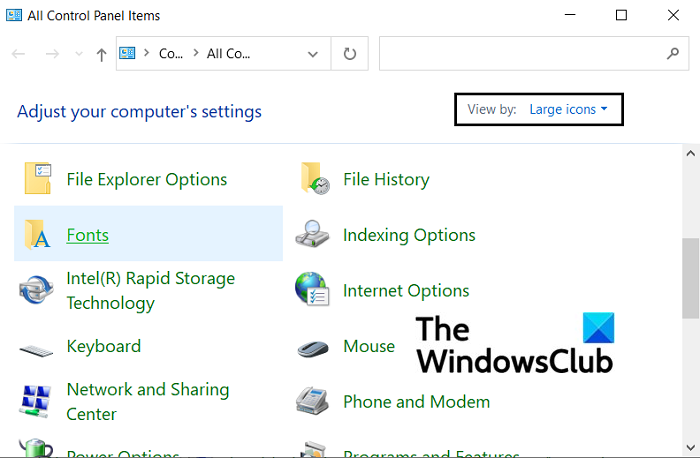
In the subsequent window, you’ll see a list of options to your left. Click on Font Settings.
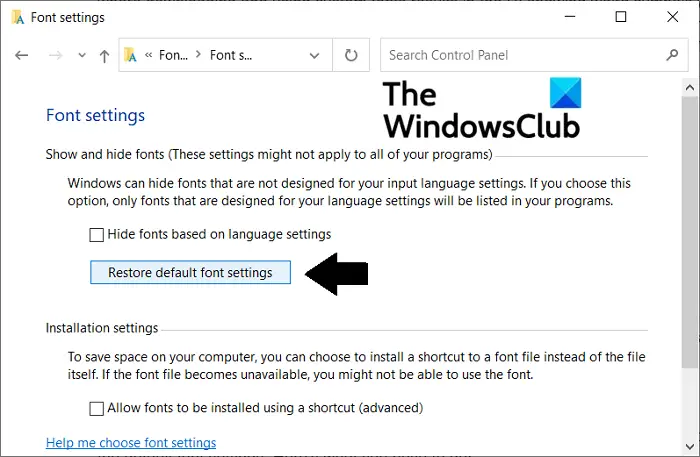
You’ll see a prompt here. In this Font Settings window, click on Restore default font settings. Once you’re done with that, reboot your PC to make the change take effect.
2]Reset default font settings using the Registry
The same process as above can be replicated by creating a ‘.reg’ with the contents to revert to the default font settings. Here’s what you have to do:
Open the Run dialog box and in the empty space type ‘Notepad.exe’. Press Ctrl+Shift+Enter to open an elevated Notepad
Once there, paste the following source code there:
Windows Registry Editor Version 5.00 [HKEY_LOCAL_MACHINE\SOFTWARE\Microsoft\Windows NT\CurrentVersion\Fonts] "Segoe UI (TrueType)"="segoeui.ttf" "Segoe UI Black (TrueType)"="seguibl.ttf" "Segoe UI Black Italic (TrueType)"="seguibli.ttf" "Segoe UI Bold (TrueType)"="segoeuib.ttf" "Segoe UI Bold Italic (TrueType)"="segoeuiz.ttf" "Segoe UI Emoji (TrueType)"="seguiemj.ttf" "Segoe UI Historic (TrueType)"="seguihis.ttf" "Segoe UI Italic (TrueType)"="segoeuii.ttf" "Segoe UI Light (TrueType)"="segoeuil.ttf" "Segoe UI Light Italic (TrueType)"="seguili.ttf" "Segoe UI Semibold (TrueType)"="seguisb.ttf" "Segoe UI Semibold Italic (TrueType)"="seguisbi.ttf" "Segoe UI Semilight (TrueType)"="segoeuisl.ttf" "Segoe UI Semilight Italic (TrueType)"="seguisli.ttf" "Segoe UI Symbol (TrueType)"="seguisym.ttf" "Segoe MDL2 Assets (TrueType)"="segmdl2.ttf" "Segoe Print (TrueType)"="segoepr.ttf" "Segoe Print Bold (TrueType)"="segoeprb.ttf" "Segoe Script (TrueType)"="segoesc.ttf" "Segoe Script Bold (TrueType)"="segoescb.ttf" [HKEY_LOCAL_MACHINE\SOFTWARE\Microsoft\Windows NT\CurrentVersion\FontSubstitutes] "Segoe UI"=-
Save this file by any name but make sure that the file extension is ‘.reg’. Select the File Type to be ‘All Files’ or else it will be saved as a ‘.txt’ file only
Save this file in an accessible location and once done, visit that location.
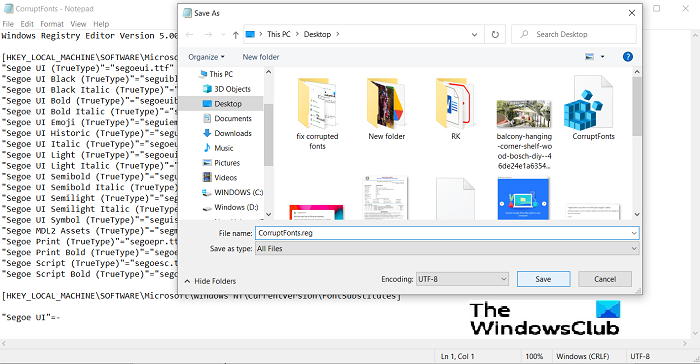
Right-click on the file and select Run as Administrator. Confirm the prompt and wait a while for the process to complete
3] Manually recreate font cache on your PC
A situation where you’re seeing abnormal fonts on your PC can also arise if your PC’s font cache has been corrupted. If that is the case, you’re going to have to rebuild the Font Cache file manually.
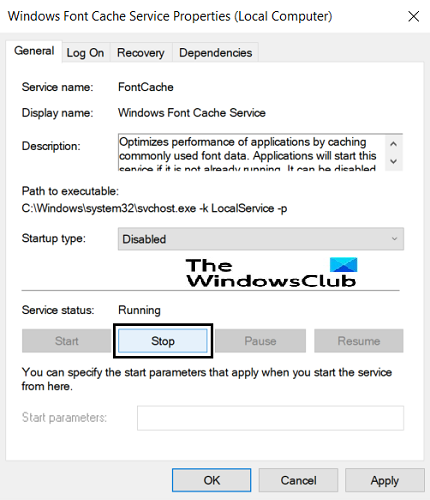
Since the Font Cache folder is protected, you’re going to have to take down the security measures to access it. Here are the steps you need to follow:
1] Open the Services Manager via the Run dialog box by typing ‘services.msc’. In the list of the various services running on your PC, locate Window Font Cache Service. Double-click on it to open its Properties. Visit the General tab and set the Startup tab to a Disabled setting. Now, under the Services Status option, press Stop and apply these settings.
2] Repeat the aforementioned steps for the service named Windows Presentation Foundation Font Cache 3.0.0.0.
3] Once done, close the Services Manager and open Windows Explorer. Copy and paste the following path there:
C:\Windows\ServiceProfiles\
Confirm the subsequent warning that’s shown and go to AppData > Local > FontCache.
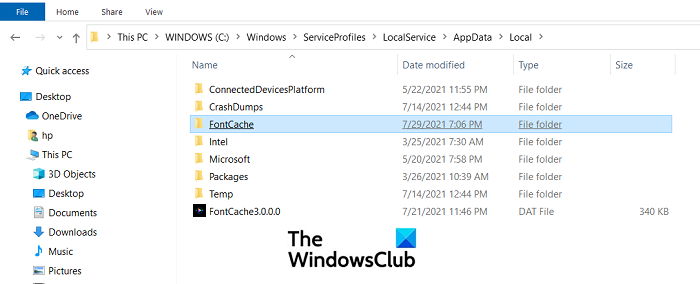
Here, you’ll see a bunch of files.
Press Ctrl+A to select them all and press Delete.
4] Now, navigate to the location below, select the FontCache.dat file and delete it.
C:\Windows\ServiceProfiles\LocalService\AppData\Local
5] Visit the System32 folder on your PC and right-click on your FNTCACHE.DAT file to delete it.
Once done, reboot your PC and enable the services you’d previously disabled from the Services Manager.
How do I enable ClearType?
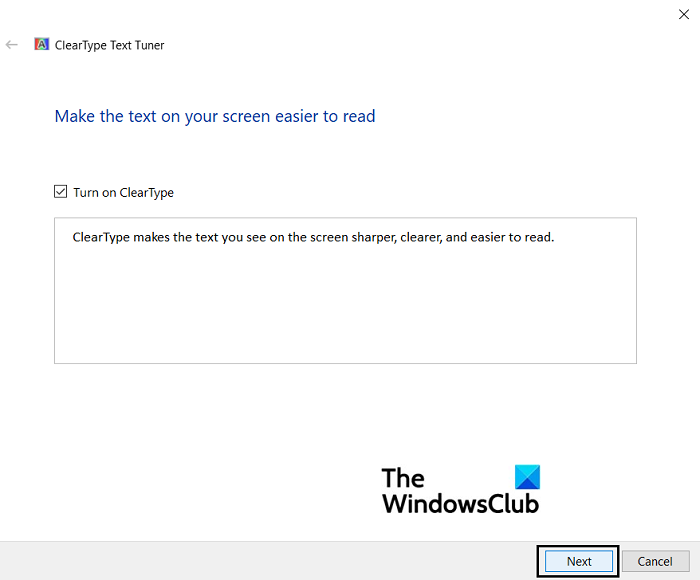
ClearType is a Windows utility that helps in improving a user’s readability on the computer. To enable ClearType on your PC, simply search for it in the Taskbar Search Pane. Since it’s a built-in feature, you’ll see a setting by its name in the Control Panel. Open that, select ‘Turn on ClearType’ and click on Next.
Read: How to rebuild Font cache in Windows
Where can I find corrupted Fonts?
There’s a very easy process in place to detect the presence of corrupt fonts on your Windows PC. Here’s how it goes:
- Open the Fonts folder on your PC. Typically, it is found in the Windows folder of your C: drive
- Click on Details and select the View option
- If a font file shows its size to be ‘0’, that file is corrupted. You can uninstall and download a fresh copy of this font
We hope this post is going to help you be better equipped to deal with corrupt fonts from here on out.
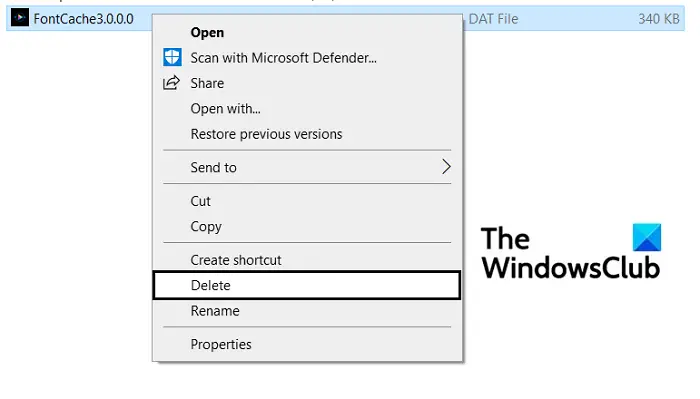
Leave a Reply